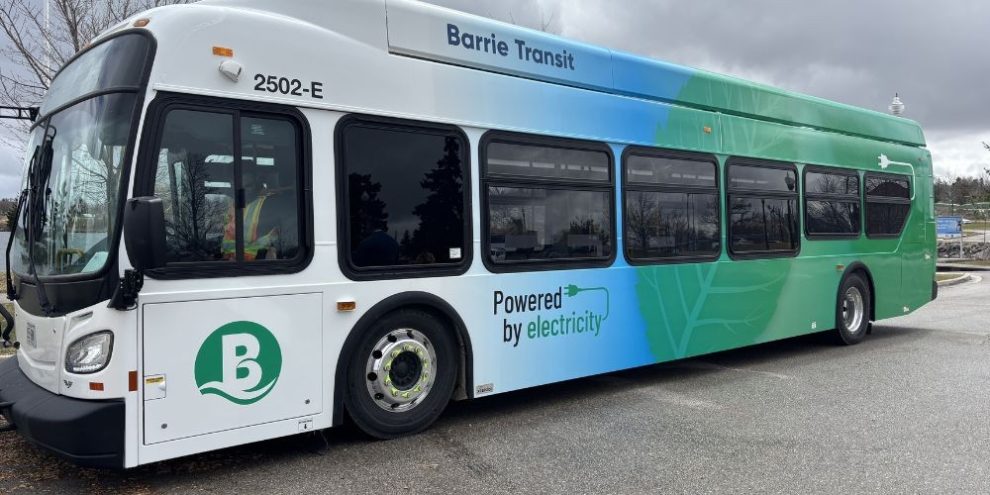
The City of Barrie's two electric buses hit the road shortly after Canada Day, as part of a 12-month pilot project to test their efficiency.
The e-buses will be rotating through all fixed routes in the coming weeks and months.
Each bus costs $1.5 million, as opposed to $1 million for a non-electric bus.
Funding ($1.65 million) for the e-bus project came through the Housing, Infrastructure and Communities Canada's Zero Emisson Transit Fund, leaving the city with a tab of $1.7 million to purchase the buses and the charging infrastructure to support them.
According to a city news release in April, the battery-electric, zero-emission bus "is one of the most advanced models on the market."
Evan Chen, manager of transit fleet for the City of Barrie, says key performance indicators assigned to the e-buses include range, energy consumption, and energy efficiency in terms of kilowatt hours per kilometre.
"We're also going to be looking at dollars per kilometre for the electric bus versus a conventional bus," Chen added.
The city already knows that each e-bus has a range of approximately 408 kilometres.
Barrie is part of different industry groups and has received data and experiences from other Ontario transit systems that have e-buses as part of their fleet and have been in service for the past few years.
"There are certainly different challenges that they've encountered in the winter, especially with these early e-buses. They noticed there was an effect on the range and efficiency of these electric buses," said Chen. "Of course, this is due to the cold and the systems needed to maintain battery temperature and to run the heaters to ensure passenger comfort, which all contribute to the increased energy demand."
But as more transit agencies started getting these electric buses, and with the advanced technology, Chen says there has been a better understanding of how the operational behaviour affects the electric bus range, and they were able to mitigate some of these challenges.
Barrie's News Delivered To Your Inbox
By submitting this form, you are consenting to receive marketing emails from: Central Ontario Broadcasting, 431 Huronia Rd, Barrie, Ontario, CA, https://www.cobroadcasting.com. You can revoke your consent to receive emails at any time by using the SafeUnsubscribe® link, found at the bottom of every email. Emails are serviced by Constant Contact
Chen says he has found that there really isn't that big of a difference between summer and winter in Ontario when it comes to how operational behaviour impacts e-buses.
"This is because in summer we have high temperatures and humidity, which means we will need to use the AC a bit more, and vice versa, in the winter, we'll need to run the heater a bit more due to the cold."
Chen points out that Barrie has its own challenges, in particular, "quite a few hills."
"This pilot program will give us a unique insight into the electric bus performance based on the city's own specific operating conditions."
There is something else about electric buses that may not have been front and centre for transit agencies that use them, but it stood out among riders.
"In addition to the environmental factors, they're also more quiet," says Chen. "That definitely helps in terms of noise pollution that we probably encounter throughout the city. That's the number one thing some of these agencies have mentioned with their riders is just how quiet and smooth the ride is, and it's something that they didn't think was that big a deal, but it turned out to be a nice bonus to have."
Once the e-bus pilot is completed, Chen says they will come back to council with a report of data and key performance indicators to see if it is a good fit for the city and if it wants to continue down the path of electrifying its transit fleet.
The City of Barrie has pledged to reduce carbon emissions to net-zero by 2050, and while e-buses are helping to drive that goal forward, there are bumps in the road to consider.
Some transit agencies have found that e-buses are the way of the future, but challenges such as capital costs and the need to upgrade infrastructure in their transit garages are a concern.
"Those are challenges we are definitely in discussion about as part of these industry groups," Chen says.
He does see the road ahead as one with electric buses, though cautiously moving forward to make sure services are maintained.
Aside from the two e-buses, Barrie Transit has 46 conventional diesel buses in its fleet.




